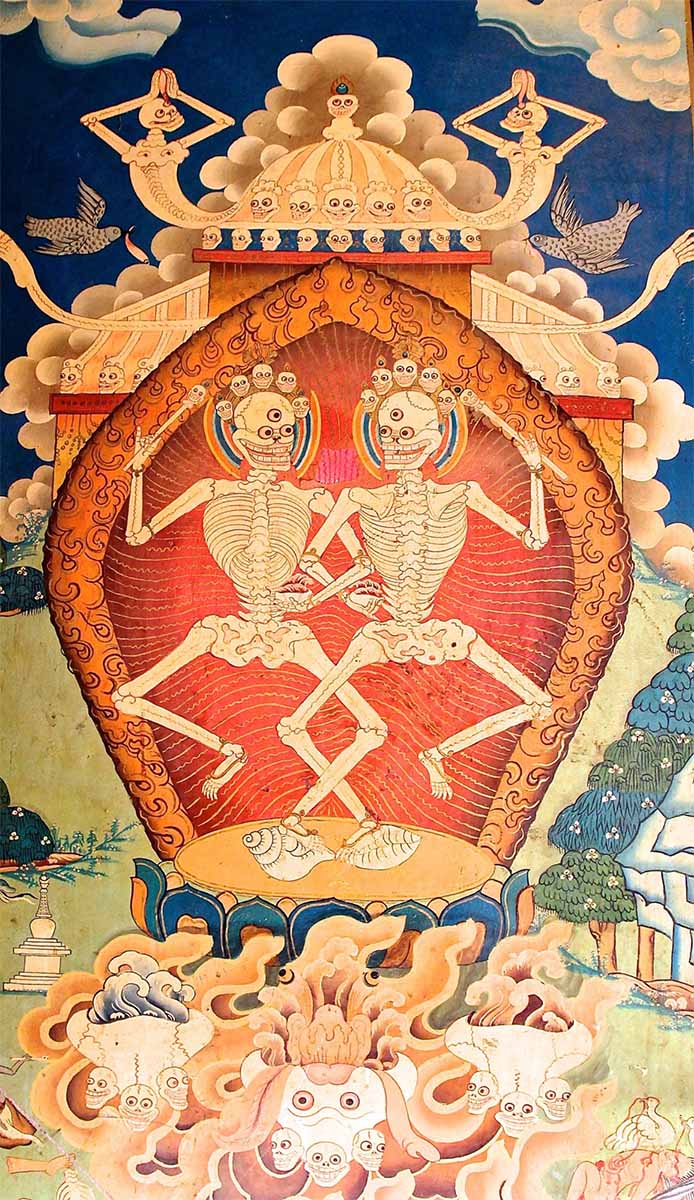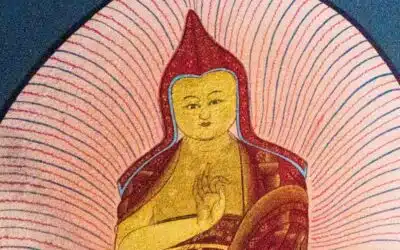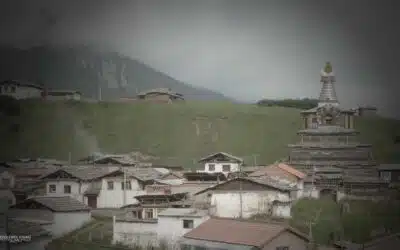Hello my pain

Written by Paul Baffier
Blog | Daily Life Testimonials | Dzogchen Testimonials | What about me?
Hello my pain
I dragged my feet to get to work. My leg hurts. This knee has been fucked up for fifteen years. It squeaks and groans, but it’s still supporting me. But for how long?
As one problem never comes alone, the weakness of the knee leads to a problem with the hip – unless it’s the other way round – the hip hurts too: it always swings to the side at the wrong moment, impossible to keep in line. It’s a real struggle to walk. How much longer is this going to last?
Because the hip has this tendency to go-off axis, all the muscles compensate. It’s amazing how the body can manage the unmanageable. It’s leaking all over the place, it’s hurting more and more every day, but it’s still looking for solutions to the unsolvable. It’s crazy. It’s a colossal risk to have a body.
In his last public letter, the Dzogchen master Namkhai Norbu wrote his health problems. “The human body is very complicated”, he wrote. He recounted the prescriptions, the visits and the medical care: this might seem trivial, a world away from spiritual practice, but it seemed to me to represent the heart of the problem: there comes a time when the degenerating conditions of the human body, the medical recommendations, the practices, correct or incorrect, of the hospital world…. must get into place within your Dzogchen practice. Whether the view of reality around you is wise or false, altruistic or misguided, your practice must be able to integrate all of this, without confronting or denying it. The Great Perfection is also the Perfection of the end, of pain, of the poorly cared for, the poorly formed, the imperfect.

“It’s up to us now to combine the millennia-old instructions — still active and preserved — of the Great Perfection, with our current understanding of what makes us Human.”
It’s not just the muscles that compensate. The spine also takes its load. It’s holding up for now. But for how long?
I wonder how many times in my human life I’ve thought “for now”. Have you counted? How many times in our human life have we put ourselves in the situation of saying to ourselves: “It’s already shit. Later it will be even more shit. But right now I’m not going to think about it. Right now I’m going to forget about it.
It’s this dialectic of forgetting between “for now” and “how much longer will it last” that makes up a large part of our human lives. A life of oblivion if a spiritual practice does not clarify this obscure denial that we take for a sandbox of tranquility.
Fateful. That’s what death and the degeneration of the physical support are. Yet this fatum is good news. For it is the only truth. We may disagree about politics, cinema or the menu of the day, but in fact we shouldn’t disagree about this truth: we’re all going to degenerate and die. This inexorable fact is our community. It is inevitable. On this basis, we have two choices: to continue in denial, blindness and the “sleep of death” (Hamlet) that makes us see carefree bears in a world of tyrannosaurs; or to take responsibility for the love, fraternity and generosity of our “dying together”, which is the unsurpassable horizon of our human condition.
Why shouldn’t it be a horizon of love, since we all have to go through it?
From then on, caring for each other – for each other’s degeneration and death – will be our greatest spiritual practice.
This spiritual practice, generous and profound, will be indistinguishable from our very material, very limited, very animal conditions. It will deal with the limits of our understanding of the millennia of spirituality and civilisation that have gone before us. Even if we don’t know any rituals or sacred texts, we can assume that the kindness of caring for the other-than-self is the foundation of every civilisation and every spirituality.

Eating, drinking, sleeping. To breathe, to be able to move. Caring for the quality of each other’s eating-drinking-sleeping, of each other’s ability to move, can be the basis of a spiritual practice.
It’s up to us now to combine the millennia-old instructions — still active and preserved — of the Great Perfection, with our current understanding of what makes us human.
In this context, we must rediscover this intimate knowledge that the suffering of others is similar — equal — to our own. By rediscovering the profound truth of our common suffering, we can discover its ontological ground: the primordial basis, free of all suffering and degeneration, moves freely in all the phenomena we experience. This discovery, when fully realised, unfolds the great ultimate compassion for each of the manifestations of our reality, without separation.
In this sense, meditating on our inevitable degeneration, on the meaning of our ageing, brings us closer to the ethical wisdom of “caring”, which can lead to the direct experience of that unlimited, immeasurable compassion that is both the foundation of the mind of every sentient being and the ultimate spiritual realization that all seekers of light have always sought.
That’s why, starting small, I am reminded of the meditation suggested by Bernard Werber in his book “La Révolution des Fourmis” (The Ant Revolution): turn your attention to your body, your limbs, and say: “Hello, my leg, hello, my pain”.
Join Our Newsletter
Subscribe to receive the Latest News, Updates and Brand New Articles from Dzogchen Today!
Plus d’articles
Phenomena
"Phenomena" is the second entry in a new category designed to improve understanding of essential Dzogchen words and concepts.
The Story of the First Masters: Manjushrimitra
We continue the Stories of the First Dzogchen Masters with Manjushrimitra, who structured the verses of Dzogchen into three series.
Diebu
In this article, “Diebu,” Mila Khyentse discusses the places of the lineages, particularly that of Diebu.



